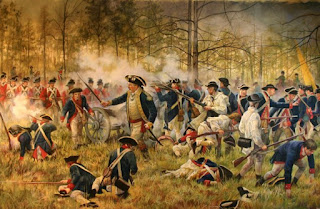Have you ever wondered what happened to the 56 men
who signed the Declaration of Independence?
Five signers were captured by the British as traitors,
and tortured before they died.
Twelve had their homes ransacked and burned.
Two lost their sons serving in the Revolutionary Army;
another had two sons captured.
Nine of the 56 fought and died from wounds or
hardships of the Revolutionary War.
They signed and they pledged their lives, their fortunes,
and their sacred honor.
What kind of men were they?
Twenty-four were lawyers and jurists.
Eleven were merchants,
nine were farmers and large plantation owners;
men of means, well educated,
but they signed the Declaration of Independence
knowing full well that the penalty would be death if
they were captured.
Carter Braxton of Virginia, a wealthy planter and
trader, saw his ships swept from the seas by the
British Navy. He sold his home and properties to
pay his debts, and died in rags.
Thomas McKeam was so hounded by the British
that he was forced to move his family almost constantly.
He served in the Congress without pay, and his family
was kept in hiding. His possessions were taken from him,
and poverty was his reward.
Vandals or soldiers looted the properties of Dillery, Hall, Clymer,
Walton , Gwinnett, Heyward, Ruttledge, and Middleton.
At the battle of Yorktown, Thomas Nelson, Jr., noted that
the British General Cornwallis had taken over the Nelson
home for his headquarters. He quietly urged General
George Washington to open fire. The home was destroyed,
and Nelson died bankrupt.
Francis Lewis had his home and properties destroyed.
The enemy jailed his wife, and she died within a few months.
John Hart was driven from his wife's bedside as she was dying.
Their 13 children fled for their lives. His fields and his gristmill
were laid to waste. For more than a year he lived in forests
and caves, returning home to find his wife dead and his
children vanished.
who signed the Declaration of Independence?
Five signers were captured by the British as traitors,
and tortured before they died.
Twelve had their homes ransacked and burned.
Two lost their sons serving in the Revolutionary Army;
another had two sons captured.
Nine of the 56 fought and died from wounds or
hardships of the Revolutionary War.
They signed and they pledged their lives, their fortunes,
and their sacred honor.
What kind of men were they?
Twenty-four were lawyers and jurists.
Eleven were merchants,
nine were farmers and large plantation owners;
men of means, well educated,
but they signed the Declaration of Independence
knowing full well that the penalty would be death if
they were captured.
Carter Braxton of Virginia, a wealthy planter and
trader, saw his ships swept from the seas by the
British Navy. He sold his home and properties to
pay his debts, and died in rags.
Thomas McKeam was so hounded by the British
that he was forced to move his family almost constantly.
He served in the Congress without pay, and his family
was kept in hiding. His possessions were taken from him,
and poverty was his reward.
Vandals or soldiers looted the properties of Dillery, Hall, Clymer,
Walton , Gwinnett, Heyward, Ruttledge, and Middleton.
At the battle of Yorktown, Thomas Nelson, Jr., noted that
the British General Cornwallis had taken over the Nelson
home for his headquarters. He quietly urged General
George Washington to open fire. The home was destroyed,
and Nelson died bankrupt.
Francis Lewis had his home and properties destroyed.
The enemy jailed his wife, and she died within a few months.
John Hart was driven from his wife's bedside as she was dying.
Their 13 children fled for their lives. His fields and his gristmill
were laid to waste. For more than a year he lived in forests
and caves, returning home to find his wife dead and his
children vanished.
Remember: Freedom is never free!

Comments
Post a Comment